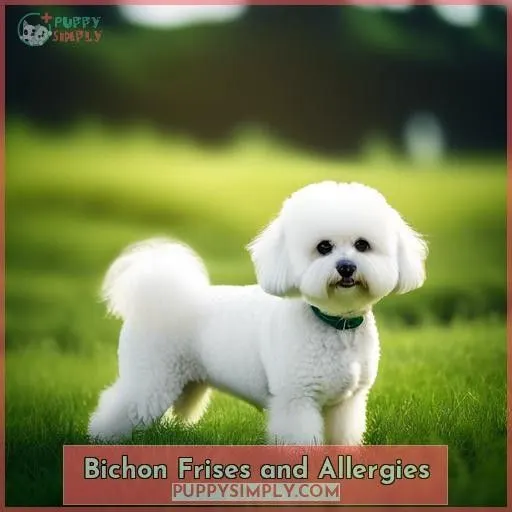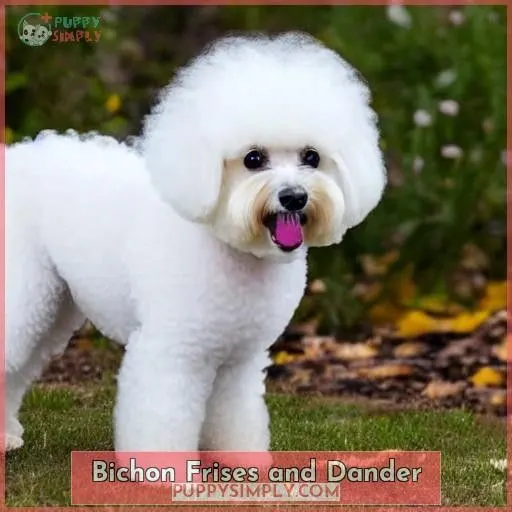This site is supported by our readers. We may earn a commission, at no cost to you, if you purchase through links.

Bichon Frises are often considered a more hypoallergenic dog breed, but they’re not entirely allergen-free. While Bichons have a low-shedding, curly coat that produces less dander, they still carry proteins in their saliva that can trigger allergies.
Regular grooming is essential to manage allergens, but you’ll still need to take precautions like using air filters and vacuuming frequently. If you’re considering a Bichon Frise, it’s best to spend time with one first to see if you have a reaction.
Table Of Contents
- Key Takeaways
- Are Bichon Frises Hypoallergenic?
- What is Hypoallergenic?
- Bichon Frises and Allergies
- Are Bichon Frises Hypoallergenic?
- Bichon Frises and Dander
- Bichon Frises and Saliva
- Bichon Frises and Shedding
- Bichon Frises and Coat Maintenance
- Choosing a Hypoallergenic Breed
- Reducing Allergy Triggers
- Other Hypoallergenic Dog Breeds
- Frequently Asked Questions (FAQs)
- What specific proteins in Bichon Frise saliva, urine, or dander are most likely to cause allergic reactions?
- How often should a Bichon Frise be bathed to maintain its hypoallergenic qualities?
- Can Bichon Frises be crossbred with other hypoallergenic breeds to create a more allergy-friendly dog?
- How does the Bichon Frises coat type and grooming routine affect its hypoallergenic status?
- Are there any specific precautions or measures that should be taken when introducing a Bichon Frise to a household with allergy sufferers?
- Conclusion
Key Takeaways
- Bichon Frises are often considered hypoallergenic due to their low-shedding, curly coat, but they can still trigger allergic reactions.
- Regular grooming is essential to manage allergens, but people with dog allergies should consult an allergist and choose a breed that suits their needs.
- Bichon Frises have a double coat and need regular grooming to prevent mats and tangles, which can cause skin irritation and potential allergic reactions.
- While no dog breed is entirely hypoallergenic, Bichon Frises are known for their allergy-friendly qualities and are often a good fit for allergy sufferers with proper management strategies.
Are Bichon Frises Hypoallergenic?
Yes, Bichon Frises are often considered hypoallergenic because they shed less than many other breeds, which can be better for allergy sufferers. However, no dog breed is completely allergen-free, and individuals with allergies may still experience reactions.
What is Hypoallergenic?
Hypoallergenic refers to a substance or breed that’s unlikely to cause allergic reactions.
Allergies to dogs are typically caused by proteins in their saliva, urine, or dander.
While no dog breed is truly hypoallergenic, some breeds produce less dander or have coat characteristics that may reduce allergen triggers.
Bichon Frises, for example, are often considered hypoallergenic because they shed less than many other breeds, reducing pet hair and dander. However, they can still cause allergic reactions, especially if their curly, dense coats trap dander.
Regular grooming helps maintain hypoallergenic qualities, but caution is necessary for people with dog allergies.
It’s crucial to consult an allergist for specific dog allergies and choose a breed that suits your needs and allergy management strategies.
Bichon Frises and Allergies
Bichon Frises are often considered hypoallergenic due to their low-shedding nature, but they can still trigger allergies. Here are three ways to manage allergy triggers with Bichon Frises:
- Keep rooms dog-free: Prevent direct contact with the dog to minimize exposure to allergens.
- Vacuum furniture and carpet regularly: Remove dander and pet hair from surfaces.
- Use a high-quality air filter: Filter out allergens from the air in your home.
Are Bichon Frises Hypoallergenic?
Bichon Frises are frequently deemed hypoallergenic because of their hair rather than fur, which lessens shedding and the production of pet dander. However, it’s paramount to comprehend that no dog breed is wholly allergen-free, and Bichon Frises can still trigger allergic reactions in certain people. To address allergies with a Bichon Frise, ponder the following advice:
- Regular grooming: Bichon Frises demand monthly baths and daily brushing to preserve their coat and diminish the quantity of dander.
- Hypoallergenic products: Employ hypoallergenic shampoos and grooming products to reduce the likelihood of allergic reactions.
- Frequent cleaning: Regularly clean your home, employing a HEPA filter or air purifier to remove allergens.
- Allergy testing: Spend time with a Bichon Frise before bringing one into your home to guarantee you don’t experience a reaction.
- Limit exposure: Keep the dog away from the bedroom and off the bed during sleep to reduce exposure to allergens.
While Bichon Frises are frequently well-received by people with sensitivities, it’s essential to grasp that no breed is entirely hypoallergenic.
Bichon Frises and Dander
Bichon Frises are renowned for their allergy-friendly qualities, making them a sought-after breed for allergy sufferers. However, familiarity with their behavioral traits and grooming needs is imperative for handling potential allergens. Bichon Frises possess a double coat comprising a soft undercoat and a curly outer coat. The breed often resembles a cotton ball due to its curled double coat, which varies in color but is typically white with shades of cream, buff, or apricot around the ears or on the body.
Grooming is paramount for Bichon Frises, as their hair continues to grow and doesn’t fall out. Regular grooming aids in preventing knots and tangles, which can cause skin irritation and potential allergic reactions. Ideally, Bichon Frises should have a full-service grooming session every 4 weeks, encompassing a bath, haircut, ear cleaning, anal gland squeezing, and nail trimming. Regular grooming can help maintain a healthy coat and reduce allergen levels.
Bichon Frises are also known for their playful and social nature, making them excellent companions for families and individuals. They’re generally easy to care for and can be a good fit for allergy sufferers. However, it’s crucial to remember that no dog breed is entirely hypoallergenic, and individual reactions to allergens can vary.
Bichon Frises and Saliva
Just as we brushed off the dander topic, let’s venture into the slobbery realm of Bichon Frises and saliva. You might assume these fluffy companions are merely showering you with affection, but their saliva harbors a surreptitious allergen.
- Saliva Secrets: Despite their hypoallergenic designation, Bichon Frises’ saliva retains the potential to provoke allergic responses.
- Grooming Galore: Diligent grooming can assist in controlling saliva distribution, effectively mitigating those allergic reactions.
- Health Hurdles: Be aware that saliva may convey proteins associated with canine allergies, not to mention contribute to ailments such as corneal dystrophy and diabetes mellitus.
Bichon Frises and Shedding
Bichon Frises are often thought of as hypoallergenic because they shed less and make less pet dander than other breeds. However, it’s important to know that no dog breed is completely hypoallergenic, and people can react differently to a Bichon Frise’s coat or dander. If you’re thinking about getting a Bichon Frise and have allergies, it’s a good idea to spend time with one to see if you react to their coat or dander.
In terms of grooming, Bichon Frises need regular grooming to keep them looking and feeling good. They’ve a double coat, with a soft undercoat and a curly, thick outer layer that helps keep them cool or warm. Grooming should be done at least two to three times a week, or even every day, to stop mats and tangles. Regular grooming also helps to get rid of any loose or dead hair that could cause allergies.
It is also important to note that Bichon Frises can have skin problems, such as allergies, which can be caused by things in the environment like pollen or food. In such cases, it’s important to see a veterinarian to find out what’s causing the problem and the best treatment.
Bichon Frises and Coat Maintenance
As a Bichon Frise owner, you’re aware that their affable coat is a significant component of their allure.
However, maintaining this coat can be arduous, particularly for those with sensitivities.
Consistent grooming is paramount to control shedding and minimize allergens.
Brush your Bichon Frise daily and bathe them at monthly intervals.
Trim their coat monthly, cleanse their ears monthly, and trim their nails regularly.
Bear in mind, a well-groomed Bichon Frise not only enhances their appearance but also aids in reducing allergy triggers.
Choosing a Hypoallergenic Breed
When choosing a hypoallergenic breed, it’s essential to acknowledge that no dog is completely allergy-free; however, certain breeds, such as the Bichon Frise, produce less dander and shed minimally, potentially reducing allergic reactions. To further minimize triggers, it’s necessary to implement allergy management strategies, including consistent grooming, frequent vacuuming, and air purification.
Hypoallergenic Breed Selection
When selecting a hypoallergenic breed, consider breeds that produce less dander, such as Schnauzers, Maltese, and Bichon Frise.
For saliva management, consider breeds like Portuguese Water Dogs.
To control shedding, look at breeds like Labradoodles and Xoloitzcuintlis. Regular grooming is essential for all breeds.
If you’re allergic to dander, consider breeds that shed less, like Bichon Frises.
If you’re allergic to saliva, consider breeds that drool less, like Maltese.
Always consult with an allergist to determine the best breed for your specific allergies.
Allergy Management Strategies
Regarding the management of allergies, there are various approaches you can adopt. Firstly, consider allergy testing to determine specific allergens. Subsequently, administer medications as advised by your physician. Utilize an air purifier to minimize allergens in the atmosphere.
Bathe your Bichon Frise regularly to eliminate dander and consider a specialized diet. Bear in mind, no canine breed is truly hypoallergenic, but these approaches can assist in managing allergy symptoms.
Grooming for Allergy Reduction
Grooming your Bichon Frise is like defusing an allergen time-bomb; regular brushing and the right bathing products can notably reduce dander. With their unique coat texture, mastering brushing techniques is key to prevent allergen accumulation. So, keep up with the grooming frequency—it’s your secret weapon in the battle against sniffles and sneezes.
Reducing Allergy Triggers
If you’re considering getting a Bichon Frise or already have one, it’s imperative to comprehend how to mitigate allergy triggers for both you and your pet. Here are four strategies to help you manage potential allergies:
- Grooming: Regular grooming is indispensable for maintaining a clean and allergy-free coat. Brush your Bichon Frise daily and bathe it weekly with a gentle, hypoallergenic shampoo. This will help remove dander and reduce the risk of allergic reactions.
- Air Purifiers: Invest in a first-rate air purifier with a HEPA filter to eliminate pet dander and other allergens from your home’s air. This will help reduce exposure to allergens and create a cleaner, healthier environment for you and your pet.
- Allergy Medications: If your pet is suffering from allergies, consult with your veterinarian about the most effective over-the-counter or prescription medications to alleviate symptoms. Some common options include antihistamines like fexofenadine (Allegra) and cetirizine (Zyrtec Allergy).
- Breed Selection: While no dog breed is truly hypoallergenic, some breeds may be more suitable for allergy sufferers. Bichon Frises are known for shedding less than many other breeds, which can help reduce pet hair and dander in your home. However, it’s imperative to remember that all dogs produce proteins that can cause allergic reactions, so diligent grooming and allergy management strategies are essential.
Other Hypoallergenic Dog Breeds
If you’re contemplating a hypoallergenic breed, there are numerous choices available. Some prevalent breeds renowned for their reduced allergenic characteristics include the Affenpinscher, Afghan hound, American hairless terrier, Barbado da Terceira, and Poodle. These breeds generate less dander and shed less, rendering them a more suitable choice for allergy sufferers.
However, it’s crucial to bear in mind that no dog breed is wholly hypoallergenic, and individual sensitivities can differ. Always consult with an allergist to ascertain the optimal breed for your particular needs.
Frequently Asked Questions (FAQs)
What specific proteins in Bichon Frise saliva, urine, or dander are most likely to cause allergic reactions?
The pesky proteins that dog owners dread are the culprits – Bichon Frises’ saliva and dander act like a triple-decker allergy sandwich, triggering sneezes and watery eyes. Knowing your foe is half the battle.
How often should a Bichon Frise be bathed to maintain its hypoallergenic qualities?
To maintain a Bichon Frise’s hypoallergenic qualities, you should bathe it monthly. Regular grooming helps trap dander and keep those pesky allergens at bay. Stick to that routine, and you’ll be breathing easy in no time!
Can Bichon Frises be crossbred with other hypoallergenic breeds to create a more allergy-friendly dog?
You bet – crossing hypoallergenic pups like Bichons with other low-shedding breeds can create doggos even better suited for allergy-prone owners. Just be sure to chat with your vet about the best fit for your home.
How does the Bichon Frises coat type and grooming routine affect its hypoallergenic status?
Your Bichon’s curly, dense coat can trap dander, a common allergen. Regular grooming helps, but these pups still shed, so allergy-prone folks must take precautions. With diligent upkeep, Bichons can be a hypoallergenic option worth considering.
Are there any specific precautions or measures that should be taken when introducing a Bichon Frise to a household with allergy sufferers?
If you have allergies, you’ll need to vacuum frequently, use a HEPA air purifier, and bathe your Bichon Frise weekly. With some precautions, this pup can work well for allergy-prone families.
Conclusion
Traversing the hypoallergenic landscape can be an arduous journey, but armed with the appropriate knowledge, you can discover a furry companion that won’t incite your sneezes. While Bichon Frises aren’t entirely free of allergens, comprehending their distinctive characteristics can aid you in discerning if this breed is the hypoallergenic dog you have been seeking.
By emphasizing meticulous grooming and utilizing prudent allergy management tactics, you can relish the companionship of a Bichon Frise, even if you’re afflicted with allergies.















